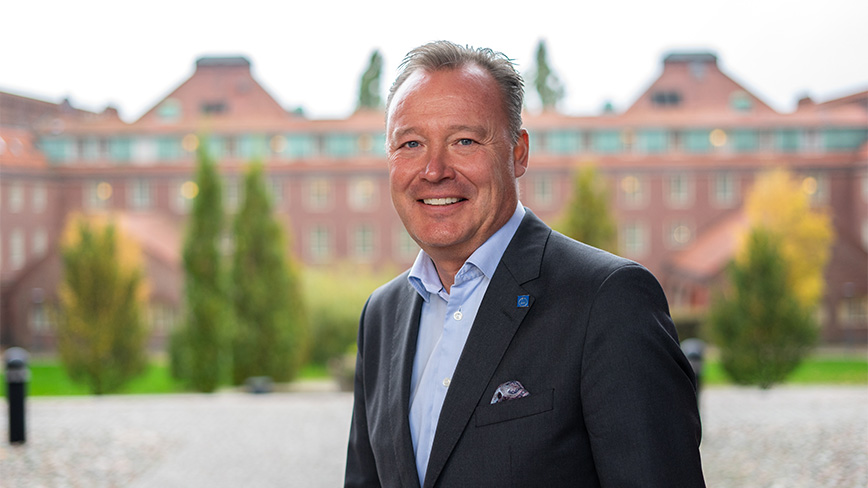Mikael about his time at CBH: all days have been fun

With a career as Head of Unit, Head of Department and Head of School both for The School of Chemistry and The School of Engineering Sciences in Chemistry, Biotechnology and Health, Mikael Lindström can count to 20 years as a leader at KTH.
At the turn of the year, he will move on to become Deputy President of the university, and he thereby ends his time at CBH, a school of which he has led the build-up since the school merger in 2018.
Here, Mikael Lindström reflects on his time as Head of School and gives his thoughts on the future.
You have been Head of School for 11 years, what does it feel like to move on to a new role?
”I have mixed feelings. I feel very strongly about CBH and that we have created a very well-functioning school since 2018. Since we merged three schools, we have achieved a good we-feeling, so it is a bit sad. I will miss all co-workers, to work this directly with others.”
“On the positive side, I get to work for the whole of KTH now. I have certainly done this at CBH as well, but now it will be clear that I exist for the whole of KTH and it will surely imply a great number of lessons. It gives a further breadth to the insight about what KTH does.”
How have these years been?
”I think all days have been fun – to come to CBH everyday has been very stimulating. Then, there have been challenges. We started strong with an inauguration in Globen and then, unfortunately the pandemic came in the way for a lot of the social part. We have four campuses and I think we have learned to use digital meetings to travel less between them.”
What successes has CBH had?
“We came out very well of RAE, five of our seven departments hold world class. I think we have achieved a lot together. I like the word fellowshipping – community and creation together. We participate in new, large research initiatives, such as Treesearch, WWSC 2.0, WISE, DDLS and KTH-DESY.”
”I believe in a trust-based and inclusive leadership. The course in inclusive leadership that we let all 60 managers at the school take turned out well. We have introduced a kind of cultural reconnaissance that can be used in daily work and we have increased awareness.”
”Then, I think we have a big focus on the need for the experimental elements in education, even if it was a big challenge for everyone during the pandemic. I think it is our way of competing in the world. We cannot compete with digital education, but well with a living campus.”
What challenges have there been?
”From the beginning, the challenge was to put together a new constellation, to create one school from three. The ones I have worked with the most are the deputy heads of school and the heads of department and everyone has done a great job during these years. We have a well-functioning management group at CBH.”
”The pandemic created challenges in the organisation and I think we handled it very well. Then, it is tougher than you think to come back. The next few years, I think we will see that we have to work more intensively with this. We need to be an attractive workplace, so that people actually want to be in our premises and not work remotely.”
”We also have a war-torn country in Europe. It is a human tragedy, but it has also affected our economic development with a very high inflation and high electricity prices. Even if this is small in comparison to what they experience in Ukraine, it will also pose challenges in our business.”
”Then, we have all the work with integrating the work for a sustainable development and gender equality, diversity and equal conditions in our education and there, our PA, GA, deputy GA and teachers have contributed greatly, it is a team effort.”
What you think about CBH’s development during these years?
”Many of our educations have a high acceptance rate, but we benefit more from the breadth we have within the subject areas biotechnology, health and medical engineering. We can create a bit more profiled educational programmes within these areas, for instance master’s programmes.”
What happpens now?
”It starts with Amelie Eriksson Karlström stepping in as Deputy Head of School on 1 January. She is first Deputy Head of School, so it is natural that she takes over. Then, there will be a process to choose a new Head of School which is led by the permanent group for managerial appointments.”
Do you have any thoughts for the future?
”I think it very important to keep the focus on the experimental activity. It is very important that education is based in our research labs and it is a strength, even if it costs to maintain.”
” There have been many useful meetings with different co-workers, which has been fun. And I feel there is a calm in the CBH organisation itself, even after a trying pandemic. I would like us to keep this calm and recover. There are many teachers who have made great efforts and I wish there was some time for recovery.”
Do you have any greeting to the co-workers?
”Even if I become Deputy President, I will still be at KTH and I hope for a continued dialogue in different contexts. In the role as Deputy President, I will continue to try to work for as good conditions as possible for education and research, given the framework, something I hope will be noticed. It will not go fast but these are my long-term driving forces.”
Text: Sabina Fabrizi
